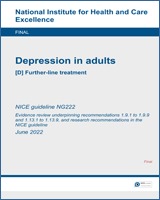From: Further-line treatment

Further-line treatment: Depression in adults: Evidence review D.
NICE Guideline, No. 222.
London: National Institute for Health and Care Excellence (NICE); 2022 Jun.
Copyright © NICE 2022.
NCBI Bookshelf. A service of the National Library of Medicine, National Institutes of Health.